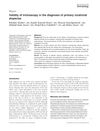 3 citations,
April 2021 in “Chemical & Pharmaceutical Bulletin”
3 citations,
April 2021 in “Chemical & Pharmaceutical Bulletin” Extracts from the Calanthe discolor plant promote hair follicle growth and increase growth factor levels.
 September 2023 in “bioRxiv (Cold Spring Harbor Laboratory)”
September 2023 in “bioRxiv (Cold Spring Harbor Laboratory)” FOL-026 peptide can help repair blood vessels and promote growth, offering potential treatment for vascular diseases.
 January 2020 in “The Journal of Sexual Medicine”
January 2020 in “The Journal of Sexual Medicine” Using 5α-reductase inhibitors for hair loss can cause lasting sexual, physical, mental, and vascular health issues in men, even after stopping the medication.
 June 2022 in “International journal of drug delivery technology”
June 2022 in “International journal of drug delivery technology” Nebivolol cream may be a promising hair loss treatment by improving blood flow and nourishing hair follicles.
6 citations,
August 2022 in “International journal of molecular sciences” α-Phellandrene may help prevent hair loss by increasing growth factors and cell growth in hair cells through a specific signaling pathway.
 13 citations,
June 2019 in “Case reports in dermatology”
13 citations,
June 2019 in “Case reports in dermatology” Fat injections in the face can cause hair loss.

Minoxidil helps stimulate hair growth and enlarge small follicles in common hair loss, but doesn't stop it, and its effects can be boosted when combined with finasteride.
 August 2023 in “Journal of Investigative Dermatology”
August 2023 in “Journal of Investigative Dermatology” Ganoderma lucidum extract and its component, ganoderic acid A, may effectively prevent hair loss.
 January 2024 in “PloS one”
January 2024 in “PloS one” Rat hair-follicle stem cells can become heart cells with specific supplements.
January 2016 in “프로그램북(구 초록집)” LED light promotes hair growth by stimulating cell proliferation and reducing cell death.
 May 2022 in “bioRxiv (Cold Spring Harbor Laboratory)”
May 2022 in “bioRxiv (Cold Spring Harbor Laboratory)” The enzyme 5α-reductase is important for proper blood vessel development during the fertility-related transformation of the uterus lining.
 34 citations,
April 2016 in “International Journal of Dermatology”
34 citations,
April 2016 in “International Journal of Dermatology” Trichoscopy is a useful method for identifying primary cicatricial alopecias and their specific types.
 1 citations,
January 2023 in “Burns and trauma”
1 citations,
January 2023 in “Burns and trauma” Tiny particles from 3D-grown skin cells speed up wound healing by promoting blood vessel growth.
 March 2024 in “Egyptian Journal of Veterinary Science”
March 2024 in “Egyptian Journal of Veterinary Science” Nandrolone decanoate damages the heart, liver, and kidneys.
 November 2024 in “Research Square (Research Square)”
November 2024 in “Research Square (Research Square)” Moracin M boosts hair growth by activating key pathways and promoting cell growth.
 19 citations,
January 2014 in “Facial plastic surgery”
19 citations,
January 2014 in “Facial plastic surgery” Dermabrasion improves skin appearance by removing the top layer to promote healing.
 November 2024 in “Journal of Cosmetic Dermatology”
November 2024 in “Journal of Cosmetic Dermatology” The plant extracts may help treat hair loss by promoting hair growth and reducing DHT levels.
 4 citations,
May 2023 in “JAAD case reports”
4 citations,
May 2023 in “JAAD case reports” Hyaluronic acid fillers for temporal lifting can cause hair loss without scarring.
 January 2024 in “Biology of sex differences”
January 2024 in “Biology of sex differences” Dihydrotestosterone makes arteries stiffer in female mice by reducing estrogen receptor expression.
 July 1996 in “Annals of Internal Medicine”
July 1996 in “Annals of Internal Medicine” International medical graduates scored higher than U.S. graduates on a medical exam.
 April 2012 in “Journal of the American Academy of Dermatology”
April 2012 in “Journal of the American Academy of Dermatology” Psoriasis patients have more comorbidities, including autoimmune diseases and other health issues, than those without psoriasis.
 3 citations,
April 1990 in “Archives of dermatology”
3 citations,
April 1990 in “Archives of dermatology” The book reveals diverse patterns of hair growth in different species and advancements in hair and alopecia research.
20 citations,
July 2019 in “Stem cell investigation” Combining SVF and PRP speeds up wound healing.
 April 2021 in “Journal of Cosmetic Dermatology”
April 2021 in “Journal of Cosmetic Dermatology” Stem cell treatment improved hair density in female hair loss patient.
 60 citations,
June 2019 in “Ageing Research Reviews”
60 citations,
June 2019 in “Ageing Research Reviews” Fat from the body can help improve hair growth and scars when used in skin treatments.
 October 2013 in “Journal of the American College of Cardiology”
October 2013 in “Journal of the American College of Cardiology” Men with male pattern baldness have increased arterial stiffness.
16 citations,
July 2001 in “Dermatologic Clinics” Dermabrasion is a skin resurfacing technique with specific steps and potential complications.
1 citations,
January 2019 in “British Poultry Science” VEGF and VEGFR-2 genes influence feather maturity, and specific genetic markers can improve chicken breeding.

Processed fat, SVF, and PRP are safe and effective for facial rejuvenation and hair growth.
 November 2008 in “Medical & surgical dermatology”
November 2008 in “Medical & surgical dermatology” A device was made in 2008 to measure hair loss severity. Other findings include: frizzy mutation in mice isn't related to Fgfr2, C/EBPx marks preadipocytes, Cyclosporin A speeds up hair growth in mice, blocking plasmin and metalloproteinases hinders healing, hyperbaric oxygen helps ischemic wound healing, amniotic membranes heal wounds better than polyurethane foam, rhVEGF165 from a fibrin matrix improves tissue flap viability and induces VEGF-R2 expression, and bFGF enhances wound healing and reduces scarring in rabbits.

























